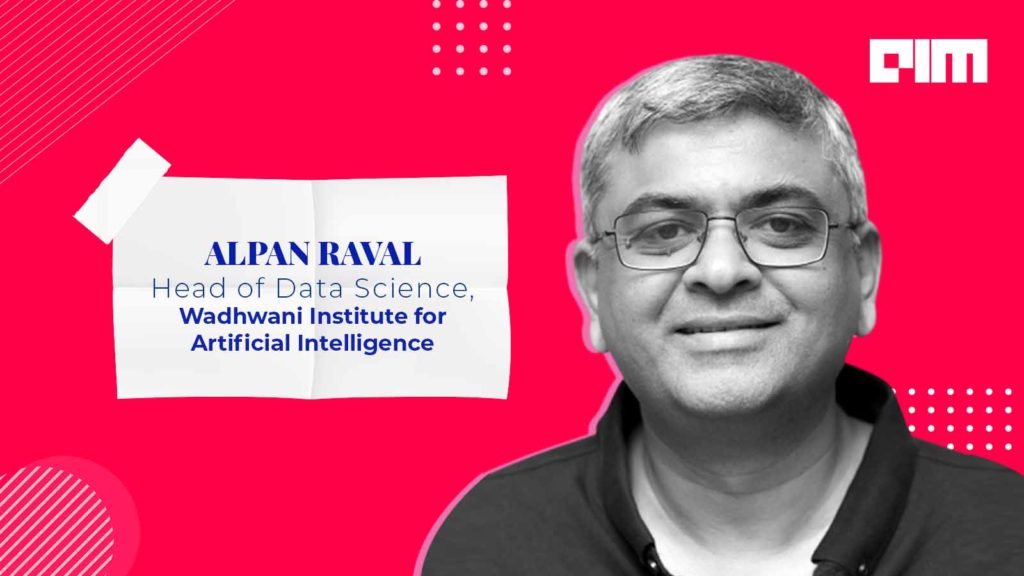This is the ninth article in the weekly series of Expert’s Opinion, where we talk to academics who study AI or other emerging technologies and their impact on society and the world.
This week, we spoke to Dr Alpan Raval, Head of Data Science at Wadhwani Institute for Artificial Intelligence. Wadhwani AI is an independent, nonprofit research institute and global hub, developing AI solutions for social good.
The institute works on various missions to develop and apply AI-based solutions for a broad range of verticals including healthcare and agriculture.
Analytics India Magazine caught up with Dr Raval, to get insights into the challenges and opportunities in Wadhwani AI’s line of work.
AIM: Where do your datasets come from and what are the major issues you face while collecting and working with datasets?
Dr Raval: Our datasets have a mix of sources. Some of the data, for our public health projects in TB for example, comes from the government, while other data is collected by us. Major issues in the data, especially from rural areas, include variability, incompleteness, and noise. For example, the subject’s age can be a noisy variable in rural settings. For image data, as in our anthropometry project, there are stark differences in lighting conditions across homes that the AI has to deal with. Many of the variables we analyse are impossible to collect in a complete manner across populations. There are always gaps.
AIM: Since India is a country with a high demographic diversity, how do you ensure inclusivity in your data?
Dr Raval: Significant sections of our data, across projects, come from rural areas. So ensuring adequate representation of rural populations is usually not a problem. There are other inclusivity issues, such as an adequate representation of under-represented minorities in rural areas that we are beginning to consciously grapple with. We are aware of these issues as we fine-tune and tweak our models and plan to address them on a case-by-case basis, as appropriate for the given problem.
AIM: Tell us about your data ownership models. How do you ensure the data benefits the people it is collected from?
Dr Raval: Our overall stand on data ownership is that the data is always owned by the data principal. Ownership does not transfer to the party that analyses the data, pre-processes it, or builds AI models on the basis of the data. Our solutions, almost by design, must benefit the people we collect data from since they will be most accurate, and therefore most useful, for those communities. We are currently either piloting or close to piloting our solutions in different areas and our pilots are mainly deployed in the communities where the data is collected from, with some representation from outside these communities to ensure that our models generalize well.
AIM: What are the challenges you face while deploying AI models across India?
Dr Raval: AI products, unlike traditional software products, have unique challenges in deployment. Shifts in data distributions can result in degradation of model accuracy with time, necessitating re-training of the models. Thus AI model application is inherently an iterative process in which a significant amount of feedback is required from on-the-ground deployment to continuously fine-tune and improve the model. This is the main technical challenge.
There are non-technical challenges too. AI-based decision-making is an entirely novel concept in the social sphere, so adoption with sufficient trust represents a barrier to entry. We must ensure privacy is preserved both in the training of the model as well as in the deployment. We must ensure, as best as we can, that the decisions are not flagrantly biased. All of these aspects are related to building trust in what we do.
AIM: How does Wadhwani AI overcome these challenges?
Dr Raval: We see many of these challenges facing us in the future as we scale up our solutions, and we aim to address them by systematically addressing potential areas of concern during the model development process. We don’t see significant roadblocks as yet, but there are always unknown unknowns.
AIM: How advanced are ‘AI for social good’ models in India and how can they improve?
Dr Raval: Central and state governments have been very supportive of what we do. AI for social good in practice is still a nascent field, not just in India, but across the world. What we need to create is examples of cases where AI has had a clear, sustained, positive societal impact at scale. These cases will spur the development of all kinds of support mechanisms.






















